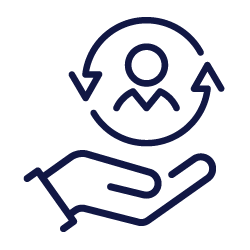
What is Becoming Career Ready?
Essential to Becoming Career Ready is the development of eight Career Readiness Competencies that you might also think of as employability skills or behaviors. All eight competencies have been identified to be important to employers. Your experiences here at Southern, including participation in classroom learning, experiential learning, internships, co-ops, research, on-campus involvement, leadership and work experience, or other on- or off-campus endeavors will provide you with the opportunity to develop and grow in the different competency areas.
Why is Becoming Career Ready Important?
- Career Readiness Competencies have been identified through research conducted by the National Association of Colleges & Employers (NACE), with input from employers across all industries, as necessary skills for success in today’s workforce and other post-collegiate pursuits.
- They have been adopted by Southern through the Office of Career and Professional Development and will be referred to as Career Readiness Competencies, ‘NACE Competencies’ or ‘Career Competencies’.
- Furthermore, the NACE Career Readiness Competencies are not only important for your success post-graduation, they can also add to your accomplishments as a student, in courses, campus activities, internships, jobs and other opportunities.
- If you want to prepare for success and set yourself apart from your peers, it’s important to not only to learn more about Becoming Career Ready and the NACE competencies, but to take action and intentionally build on the competencies you already have and enhance those that need more development.
Career Readiness Competencies

The National Association of Colleges and Employers (NACE) has identified 8 core competencies that employers seek in candidates. Career readiness is defined as “a foundation from which to demonstrate requisite core competencies that broadly prepare the college-educated for success in the workplace and lifelong career management.”
The Eight Career Competencies

Career and Self Development
Proactively develop oneself and one’s career through continual personal and professional learning, awareness of one’s strengths and weaknesses, navigation of career opportunities, and networking to build relationships within and outside of one’s organization.
Strategies for Development
- Take the FOCUS Career Assessment to identify your interests, skills, and values and how they relate to careers.
- Schedule an appointment with your Career Coach.
- Research career opportunities using JOBSs and other job search tools
- Conduct an informational interview with a faculty member or professional in your field of interest.

Communication
Clearly and effectively exchange information, ideas, facts, and perspectives with persons inside and outside of an organization.
Strategies for Development
- Take Principles of Public Speaking .
- Participate in a mock interview with your Career Coach or by using Big Interview.
- Join a professional organization and if possible attend a conference.
- Develop an elevator pitch to prepare for networking events.

Critical Thinking
Identify and respond to needs based on an understanding of situational context and logical analysis of relevant information.
Strategies for Development
- Join a debate team.
- Participate in classroom discussions.
- Evaluate the reliability of information sources used for research papers.
- Get involved in research projects with faculty.

Equity and Inclusion
Demonstrate the awareness, attitude, knowledge, and skills required to equitably engage and include people from different local and global cultures. Engage in anti-racist practices that actively challenge the systems, structures, and policies of racism.
Strategies for Development
- Join a multicultural student organization.
- Participate in Study Abroad.
- Attend a program offered by the Office of Multicultural Affairs.
- Attend a program or workshop outside of your own culture.

Leadership
Recognize and capitalize on personal and team strengths to achieve organizational goals.
Strategies for Development
- Become involved in programs offered by the Office of Student Involvement.
- Take on a leadership role in a student group or other campus involvement such as Student Government Association (SGA), or Resident Advisors.
- Serve as the leader of a class project.
- Attend OCPD workshops.

Professionalism
Understand and demonstrate effective work habits, and act in the interest of the larger community and workplace.
Strategies for Development
- Obtain professional attire or visit Thrift Stores that Provide Clothing if you are in need of professional clothing.
- Be on time!
- Complete an internship, co-op, or other experience in your chosen field to learn about workplace culture.

Teamwork
Build and maintain collaborative relationships to work effectively toward common goals, while appreciating diverse viewpoints and shared responsibilities.
Strategies for Development
- Visit OWL Connect and join a student organization.
- Volunteer in the community working with others.
- Participate in group projects within a class.

Technology
Understand and leverage technologies ethically to enhance efficiencies, complete tasks, and accomplish goals.
Strategies for Development
- Take a CISM course (CISM 1110 or higher).
- Learn industry-specific technology through your courses such as AutoCAD, SPSS, etc.
- Become Google Certified.
- Create a LinkedIn profile and utilize JOBSs.
Career Assessments
For students who are unsure of a career or major? OCPD offers assessments that can help you gain clarity.
Focus 2 Assessment
Focus 2 Careers is an online, interactive self-guided major and career exploration tool. It is meant to introduce you to your career interests, and we encourage you to explore your results using these resources as well.
Cost: Free
Length: 30-40 minutes total
Additional Resources
Many of the materials provided here have been shared by NACE members. * Please provide attribution to the original source if you use or adapt a resource.
- BAC Syllabus: Courtesy of University of Tampa
- Career & Life Studies Syllabus: Courtesy of University of Delaware
- Career Readiness Competencies Flyer: Courtesy of University of Montana
- Career Readiness Mapping Journal: Courtesy of University of Tampa
- Competencies for a Career Ready Workforce
- Curated Resources for Teaching and Assessing Career Readiness Competencies
- Internship Evaluation: Courtesy of Bryant University
- NACE Career Readiness Competency Icon Set
- Printable Poster
- Professional Skills Self-Reflection
- PowerPoint Template
